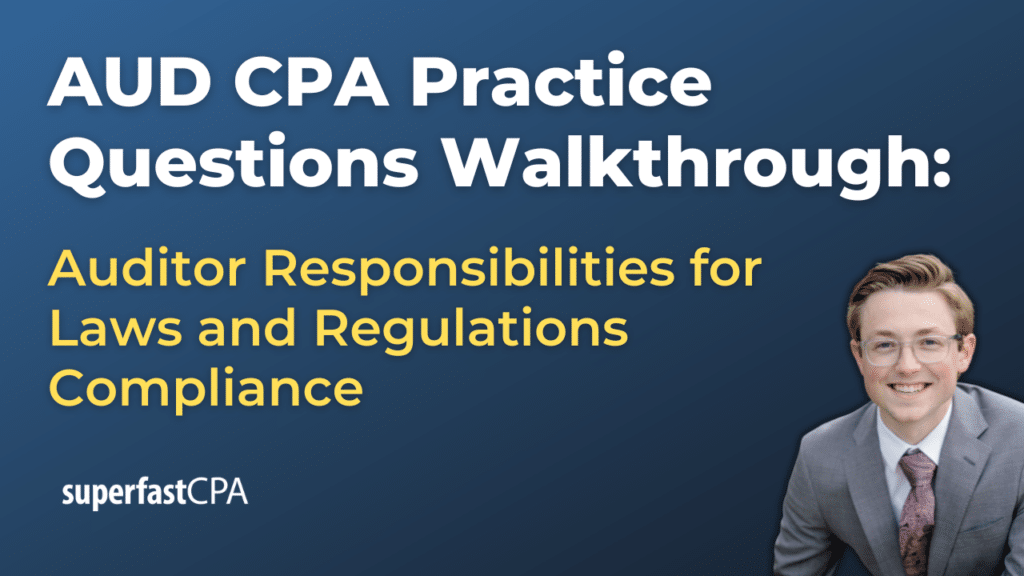In this video, we walk through 5 AUD practice questions teaching about auditor responsibilities for laws and regulations compliance. These questions are from AUD content area 2 on the AICPA CPA exam blueprints: Assessing Risk and Developing a Planned Response.
The best way to use this video is to pause each time we get to a new question in the video, and then make your own attempt at the question before watching us go through it.
Also be sure to watch one of our free webinars on the 6 “key ingredients” to an extremely effective & efficient CPA study process here…
Auditor Responsibilities for Laws and Regulations Compliance
Auditors play a critical role in assessing an entity’s compliance with laws and regulations that directly impact financial statement amounts and disclosures. While they do not enforce compliance, they must remain vigilant about potential misstatements resulting from noncompliance. This post explores the key aspects of an auditor’s responsibilities in this area.
Management’s Responsibility for Compliance
The primary responsibility for ensuring compliance with applicable laws and regulations rests with management and those charged with governance. Auditors do not prevent noncompliance, nor do they serve as legal enforcers. Their focus is on understanding the impact of noncompliance on financial statements. For example, if a company operates in a heavily regulated industry like banking, management must adhere to capital adequacy regulations. The auditor’s role is to assess whether financial statements properly reflect any material consequences of noncompliance, such as fines or liabilities.
Reasonable Assurance and Material Misstatements
Auditors provide reasonable assurance, meaning they perform procedures to detect material misstatements due to fraud, error, or noncompliance. However, they do not guarantee that all noncompliance will be identified. For instance, if a company improperly classifies regulatory penalties as operating expenses rather than separate legal costs, the auditor’s objective is to detect whether such misclassification materially affects the financial statements.
How Auditors Respond to Potential Noncompliance
If an auditor encounters information suggesting noncompliance, they must obtain an understanding of the situation and evaluate its potential effect on the financial statements. This includes:
- Discussing the matter with management and governance.
- Reviewing relevant documentation.
- Performing audit procedures to confirm whether noncompliance occurred.
For example, if an auditor learns of potential environmental violations in a manufacturing company, they may examine regulatory filings and legal correspondence to determine whether financial disclosures need adjustment.
Auditors Do Not Determine Legal Noncompliance
While auditors assess noncompliance from a financial reporting perspective, they do not make final legal determinations. Courts or regulatory bodies decide whether a violation has occurred. Auditors rely on legal counsel or regulatory findings to guide their conclusions. If uncertainty exists, they may disclose the matter in the audit report or consider modifying the opinion.
What Happens When a Client Refuses a Modified Report
If material noncompliance is identified and management refuses to accept the auditor’s modified opinion (e.g., a qualified or adverse opinion), the auditor should withdraw from the engagement. Issuing an unmodified opinion in such a case would violate professional standards.
Audit opinion outcomes include:
- Qualified Opinion: Issued when noncompliance results in a material but not pervasive misstatement.
- Adverse Opinion: Issued when noncompliance leads to a pervasive misstatement that misrepresents the financial statements.
- Disclaimer of Opinion: Issued when the auditor cannot obtain sufficient evidence regarding noncompliance and its financial impact.
- Unmodified Opinion with an Emphasis-of-Matter Paragraph: Used when an issue is significant but does not require an opinion modification.
For instance, if an auditor finds evidence of financial misreporting due to noncompliance with tax laws, but management refuses to make adjustments, issuing a qualified or adverse opinion may be necessary. If management outright refuses to accept a modified report, withdrawal is the best course of action.
Conclusion
Understanding an auditor’s responsibilities regarding laws and regulations is essential for navigating financial statement audits. While auditors do not enforce laws, they must evaluate the financial impact of noncompliance, assess management’s response, and modify reports as needed. Their role is to ensure that financial statements fairly present the company’s position, even when legal uncertainties arise.













